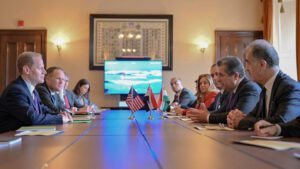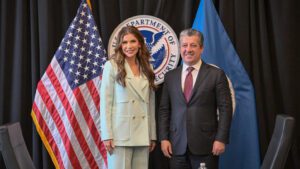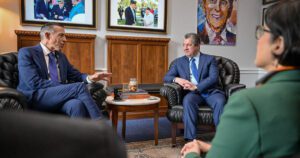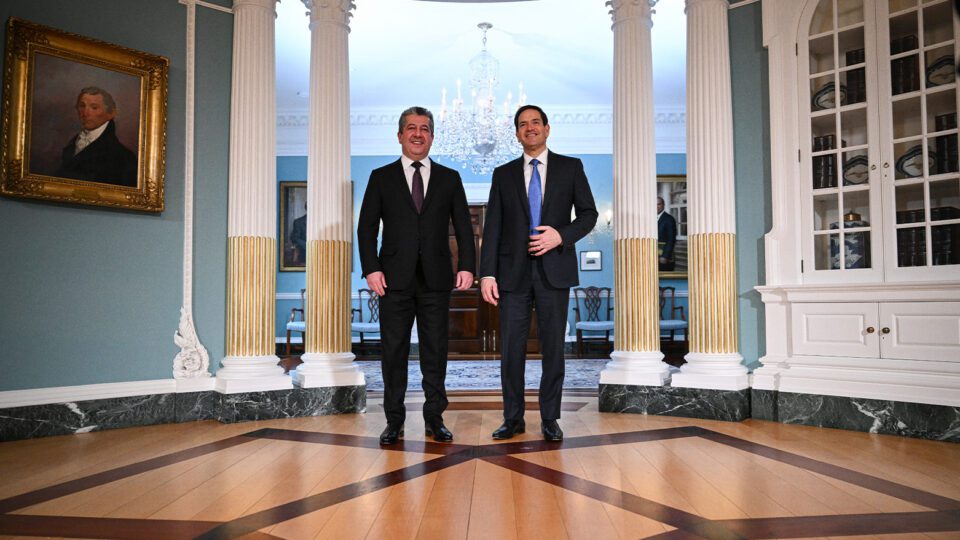PM Barzani deepens Kurdistan–U.S. alliance through high-level talks and energy deals set to benefit both Kurdistan and all of Iraq.
A strategic shift in Kurdistan–U.S. relations
The Kurdistan Regional Government (KRG) Prime Minister Masrour Barzani’s official visit to Washington in May 2025 marked a decisive turning point in U.S.–Kurdistan relations, evolving the partnership from military collaboration into a broad, multifaceted strategic alliance rooted in economic development, constitutional rights, and energy security. Through a packed schedule of over a dozen meetings with high-ranking American officials, congressional leaders, policymakers, and energy executives, Barzani underscored the Kurdistan Region’s emerging role as a secure, reform-oriented partner for long-term U.S. interests in the Middle East.
“This visit is the beginning of a new era,” PM Barzani stated. “Our relationship with the United States is evolving from a focus on military cooperation to deeper economic partnership—rooted in mutual respect, shared values, and regional stability.”
Central to the visit was the signing of two major energy agreements with U.S.-based companies—HKN Energy and Western Zagros—valued at over $110 billion. The deals, which were announced at a formal signing ceremony hosted by the U.S. Chamber of Commerce, are set to expand Kurdistan’s energy production, strengthen electricity infrastructure, and generate significant employment opportunities.
“There is no need for any party to be concerned,” Barzani reassured. “These agreements serve the interests of both the Kurdistan Region and all of Iraq. They are meant to bring more services to our citizens, improve energy reliability, and strengthen economic resilience.”
Energy diplomacy and legal standing
PM Barzani emphasized that the agreements are in full compliance with Iraq’s constitution and fall under the framework of the Kurdistan Region’s Oil and Gas Law No. 22 of 2007. “With confidence, I say these agreements are not only legal and constitutional—they are essential for stability and development,” he declared.
Rebaz Hamlan, former Deputy Minister of Finance of Iraq, reinforced this legal position, writing: “These contracts are extensions of earlier agreements approved by the Kurdistan Oil and Gas Council, which includes representatives from all political parties. Iraq still lacks a national oil and gas law, so it cannot deem these deals illegal.”
The U.S. Department of State welcomed the agreements, while U.S. Secretary of Energy Chris Wright praised Kurdistan as a promising investment destination. “Kurdistan has strong energy resources. For us, it represents a valuable investment opportunity, and we want this relationship to grow even stronger,” Wright said at the U.S. Energy Conference in Washington.
Wright added that the U.S. prioritizes energy partnerships that support high-quality electricity access in the Kurdistan Region and allow for export benefits to neighboring countries. “These projects benefit not only the Region but the entire country,” he affirmed.

Robust congressional engagement and bipartisan support
Prime Minister Barzani’s Washington agenda included detailed meetings with key senators such as Bill Hagerty, Tom Cotton, Ted Budd, Elissa Slotkin, Angus King, James Lankford, and Tom Ketten. In the House, he met with Representatives Mike Rogers, Brad Sherman, Darrell Issa, Adam Smith, Seth Moulton, Joe Wilson, and Abraham (Abe) Hamadeh.
Each meeting highlighted three core policy pillars: continued U.S. support for Peshmerga forces; protecting the constitutional status of the Kurdistan Region; and expanding economic collaboration, particularly in banking, energy, and digital governance.
Senator Hagerty hailed the agreements as “a major step forward for Kurdistan’s economic development,” while Senator Cotton raised concern over Iran’s deepening influence in Baghdad and emphasized the strategic necessity of bolstering U.S. presence in Erbil. “Kurdistan must remain a safe harbor for U.S. interests in Iraq,” he said.
Congressman Mike Rogers pointed to the importance of swiftly forming a new KRG cabinet to maintain reform momentum. Senator Slotkin, focused on defense reform, stressed the need for unified command structures within the Peshmerga to increase efficiency and operational coordination.
Congressman Joe Wilson praised Kurdish resilience and Barzani’s leadership, stating: “The Kurdistan Region is a success story. The leadership shown by Prime Minister Barzani is helping turn the page from conflict to prosperity.” Wilson also criticized the Iraqi Ministry of Oil’s opposition to U.S. energy investment in Kurdistan, calling it “a shortsighted policy that will only deepen Iraq’s dependence on Iranian gas.”

Advancing reform: finance and governance
During a high-level meeting with Acting Under Secretary for Terrorism and Financial Intelligence of the U.S. Department of the Treasury, Barzani outlined the KRG’s financial reform program. Smith voiced admiration for the progress made under the “My Account” digital banking initiative. “These reforms are impressive and could serve as a model for other countries,” he said.
Barzani reiterated his government’s commitment to enhancing transparency, digitizing public services, and modernizing the banking sector. “This is part of a larger vision to empower citizens and attract long-term investment,” he added.
A Trusted Ally in Washington
Security remained a pillar of the visit. In talks with U.S. Secretary of Homeland Security Kristi Noem, Barzani addressed joint priorities including counterterrorism, border control, and combating transnational crime. Both parties agreed to enhance institutional cooperation between the Department of Homeland Security and relevant KRG bodies.
Scott Bates, a senior figure in a national security program, noted that Barzani’s timing was no coincidence. “The Kurdish issue was among the key topics discussed during President Trump’s meetings with regional leaders,” Bates noted. “This is a highly important development.”

Strategic vision shared at the top
At a private dinner hosted by Massad Boulos, Senior Advisor to President Trump, Barzani was praised for his diplomatic leadership. “This visit was a major success,” Boulos said. “It’s time to deepen the strategic partnership between the U.S. and the Kurdistan Region.”
Barzani expressed gratitude, saying, “We view the U.S. as a steadfast ally across all sectors—from security to economy to education. We want to take this relationship to the next level.”
In his meeting with Secretary of State Marco Rubio, Barzani echoed this aspiration. “We had a very good and fruitful meeting,” he said. “There is strong American support for the people of Kurdistan and for these agreements that benefit all of Iraq.” Barzani extended a formal invitation for Rubio to visit the Kurdistan Region.
State Department Spokesperson Tommy Bruce reaffirmed support for Kurdish autonomy. “A strong and prosperous Kurdistan Region, within a federal Iraq, is in the interest of the United States, Iraq, and the Kurdistan Region alike,” Bruce said.
Academic and policy perspectives
David Patel of the Belfer Center at Harvard noted that Barzani’s vision is closely aligned with U.S. strategic goals. “Barzani and the Trump administration share a vision of private investment, stability, and regional modernization.”
Professor Amy Austin of George Washington University described the visit as “one of the most significant diplomatic events of the year,” noting that “Barzani is evolving into a post-conflict statesman, focused on building institutions.”
Kurdistan as a regional anchor
The Kurdistan Region is now home to the largest U.S. consulate in the world, located in Erbil—a symbol, Barzani said, “of the enduring friendship between our peoples.” During a special panel titled “The Future of Energy in the Kurdistan Region,” organized by Al-Monitor, Barzani laid out his vision for a future based on energy sustainability, digital governance, and international partnerships.
“Our relationship with America is not just about the past—it’s about shaping a peaceful, prosperous future for the entire region,” Barzani concluded in his keynote speech.
From ally to anchor of stability and economy
Prime Minister Masrour Barzani’s Washington visit was a comprehensive repositioning of the Kurdistan Region as not only a reliable U.S. partner, but as a stabilizing force within Iraq and the broader Middle East. The depth of bipartisan support, the scale of economic cooperation, and the clear articulation of mutual strategic goals all point to a new phase in the U.S.–Kurdistan alliance.
The Kurdish Globe

